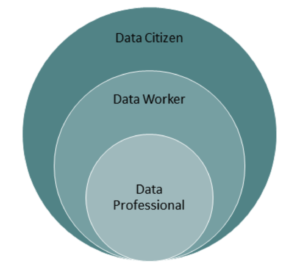We have been collaborating with Digital Leaders from the six councils in the Edinburgh and South East Scotland City Region. One of the aims of this collaboration was to recommend the appropriate digital technology infrastructure which is required to support the data education curriculum.
The report is in three parts;
- An executive summary, most of which is contained within this article
- A more detailed report covering each of the recommendations and also the background to the wide range of digital technologies available in the Region’s schools
- An online resource available to the Digital Leaders which will assist in sharing practice between the Councils and their key further and higher education partners.
Context
The aim of Data Education in Schools programme, funded by the Data Driven Innovation Skills Gateway in the Edinburgh and South East Scotland City Region Deal, is to develop skills in data literacy for learners and teachers.
The world of employment is predicted to change significantly in the future. It is anticipated that the need for some skills will disappear and the demand for other new skills and abilities will increase. As the use of automation and integrated technologies increases across all professional areas and working patterns shift, the skills profiles of different occupations are also likely to change.
Data will play an increasingly significant role in all aspects of our personal and professional lives. Ensuring that everyone has the awareness, skills and the critical data literacies needed to navigate its uses and affordances successfully is increasingly essential.
Edinburgh has the ambition to become the Data Capital of Europe and is well-positioned to become so. It is currently home to the largest technology incubator hub in Europe, home to the world-leading Edinburgh Parallel Computing Centre as well as five critical data-driven hubs serving research innovation across the health and Social Care, Public Sector, Financial Services, Fintech, Tourism and Festivals, Creative Tech, Agritech, Robotics and Autonomous Stems, Space and Satellite and Digital Tech sectors. It is predicted that as this sector grows substantially over the coming years, as many as 70,000 new jobs will be created.
 The ambition is that all citizens of the Edinburgh City Region no matter their age, gender, background or ability will be data citizens, i.e. aware of how their personal data is used, their legal rights and privacy implications.
The ambition is that all citizens of the Edinburgh City Region no matter their age, gender, background or ability will be data citizens, i.e. aware of how their personal data is used, their legal rights and privacy implications.
Equally, all citizens will have opportunities to acquire the data skills required to be competent and capable data workers within their chosen profession. Training opportunities will exist via multiple routes for citizens to learn skills to use data to critically diagnose, analyse, and predict trends and patterns, manipulate datasets and use data in a myriad of creative and communicative ways.
The need for data professionals who have the specialist skillset and knowledge to lead and steer organisations through a data-driven economy is key to its success. Ensuring that routes exist through each of these three tiers for all citizens of the city region to take advantage of these opportunities is a critical part of the ambition for the DDI Skills Gateway.
Engagement with Stakeholders
The groundwork for all three tiers of expertise – data citizen, data worker and data professional – has to begin with the region’s schools; making sure that young people of all ages have the opportunity to engage with and develop the skills and abilities to use data effectively.
 A significant strand of the DDI Skills Gateway is the Data Education in Schools programme which aims to support all schools across the region to offer a data education curriculum to its young people. Over the eight-year programme, the aim is that all 121,000 young learners across the region will have the opportunity to excel in data education regardless of gender, location, or background.
A significant strand of the DDI Skills Gateway is the Data Education in Schools programme which aims to support all schools across the region to offer a data education curriculum to its young people. Over the eight-year programme, the aim is that all 121,000 young learners across the region will have the opportunity to excel in data education regardless of gender, location, or background.
The Edinburgh City Region comprises of six Councils; City of Edinburgh, East Lothian, Fife, Midlothian, Scottish Borders and West Lothian. This report offers a comprehensive outline of the existing educational technology infrastructure across those six regions and has been compiled from several sources. The focus of the report is on the aspects of the infrastructure landscape, which are pertinent to the Data Education in Schools programme.
The report has synthesised information from several sources, and although not exhaustive, sources have included:
- Consultation with 180+ pupils across 20+ schools in the region.
- Digital Learning Teams in each of the six city region Councils
- Council IT and Business Services staff in city region Councils
- Data Education in Schools team, Moray House School of Education and Sport
- CALL Scotland, University of Edinburgh
- Personnel in Education Scotland and the Scottish Government
- Academic and professional staff from the University of Edinburgh
- Contractors from partner organisations and businesses
- Survey data from individual Councils
- Existing published data from regional and national sources
The aim of this report is not to highlight the strengths or expose the weaknesses of individual Councils or schools, but to assimilate the data gathered from a range of sources and stakeholders into a set of key findings and recommendations. These will support the development of a Data Education in Schools programme across the region over the next eight years.
Data Education in City Region Schools
 High-quality data education in schools requires investment in technology in terms of software, access to datasets and specialist hardware. Such investments will benefit not only data education but also STEM learning and the development of digital literacy across the curriculum which are both priorities of the Scottish Government.
High-quality data education in schools requires investment in technology in terms of software, access to datasets and specialist hardware. Such investments will benefit not only data education but also STEM learning and the development of digital literacy across the curriculum which are both priorities of the Scottish Government.
The role of Data Education in Schools is to provide professional learning for teachers and data learning materials mapped to Curriculum for Excellence. Our professional learning is primarily focussed on the pedagogy of data education, although we will also provide some courses on specific technology skills for teachers as necessary. We also aim to provide a technology lending library for schools within the City Region, on the understanding that local authorities may wish to pilot the use of new technologies before investing further.
Technology should not be a barrier to a school which wishes to improve data education. It is possible to teach valuable concepts in “data unplugged” activities which do not use technology at all. However, to support all stages of learning within the data problem-solving cycle, all learners will need access to general-purpose computing equipment (i.e. spreadsheet software on tablets, laptop or desktop computers) and online datasets. As it can be difficult to comfortably work with larger data sets on a small screen without a keyboard and mouse, and because the analysis functionality available on tablet software can be limited, we recommend that schools provide laptop or desktop computers for larger data projects with upper primary or secondary learners. Secondary schools which offer computing and data science qualifications will require specialist software including programming language environments and commercial data visualisation packages.
Summary of Recommendations
The recommendations in full are included in the body of the report. The summary of findings across the seven areas considered are as follows:
Access to Specific Software for Data Education
Learners need access to software and hardware for collecting, analysing and presenting data.
We should make a range of local and online tools available to schools
Tools should include spreadsheets, point and click data analysis tools, commercial visualisation tools, and programming environments for data science
Learners and teachers should have access to a wide range of data sets
Specific hardware should be made available to all schools
Supporting Technological Environment: Connectivity, Coverage and Capacity
Connectivity is an enabler of learning and teaching through digital. There are four recommendation contained within the main report, covering the following;
Focus is required by Councils and their support teams to ensure robust connectivity
Provision of connectivity for learners, teachers and visitors own technology
The design of safe connectivity models for microcontrollers, modules and platforms
Addressing barriers to access through minimising multiple sign-ons
Supporting Technological Environment: Inclusion
Data Education must be inclusively available to all learners, paying particular attention to the following;
Identifying solutions that combat the poverty-related access to technology
Looking for innovative solutions to the poverty-related bandwidth gap
Delivering accessible resources through a universal design for learning
Supporting Technological Environment: Support Staff
Having staff in place to provide support for digital learning is critical in empowering learners and teachers. This would include;
Maintaining productive dialogue between university, council, school and technical staff
Internet filter change procedures that are responsive to the needs of learners and teachers
Council staff kept abreast of emerging trends identified within data education
Enhanced professional learning support for Council Digital Learning Teams
Supporting Technological Environment: Software
Ensuring trouble-free access to local and cloud-based software that will support data and digital education is essential. This includes;
Up-to-date browsers to access online environments for data education
Identifying, sharing and opening access to cloud-based learning environments
Accessing cloud-based storage within Glow, O365 or G-Suite, and University of Edinburgh
Providing suitable coding platforms across primary and secondary stages
Addressing technical barriers to learning in Data Education, Cyber Security etc
Supporting Technological Environment: Hardware
There is an increasing need for access to digital technology for many aspects of learning, including data and digital education.
Councils need to continually review whether hardware provided is fit for purpose
University should assist by providing loan-bank access to data education specific hardware
Schools with one-to-one deployment need to address any identified gaps in functionality
University should assist in sharing practice around maker spaces
UoE Data Technology Service will assist with innovative IOT solutions
Future Research and evidence gathering
The City Region partnership should wherever feasible, contribute towards research. In particular, and if resources allow, the research should include;
- Professional dialogue around pedagogy and management of mobile technology in the classroom
- The use of data and digital and its impact on learning and teaching
Conclusions
The schools in the Edinburgh City Region will require some adjustments to their digital profile to take full value from the Data Education in Schools programme. These adjustments are achievable in all Education Authorities with the support of key personnel and the provision of a technology lending library of resources.
Critical to the success of the programme in schools will be the close working between the Data Education in Schools team, the Digital Learning Teams and their respective Technical Support Teams. Close working will maximise the likelihood that the digital tools that are available for learning and teaching are appropriate.
The University of Edinburgh, through its IOT in Schools programme, will also contribute significantly to the development of Data Education in Schools, giving pupils access to a range of front-edge sensor technology, communication and data processing platforms.

Tommy Lawson
Schools Technology Adviser
Data Education in Schools Team
tommy.lawson@ed.ac.uk



